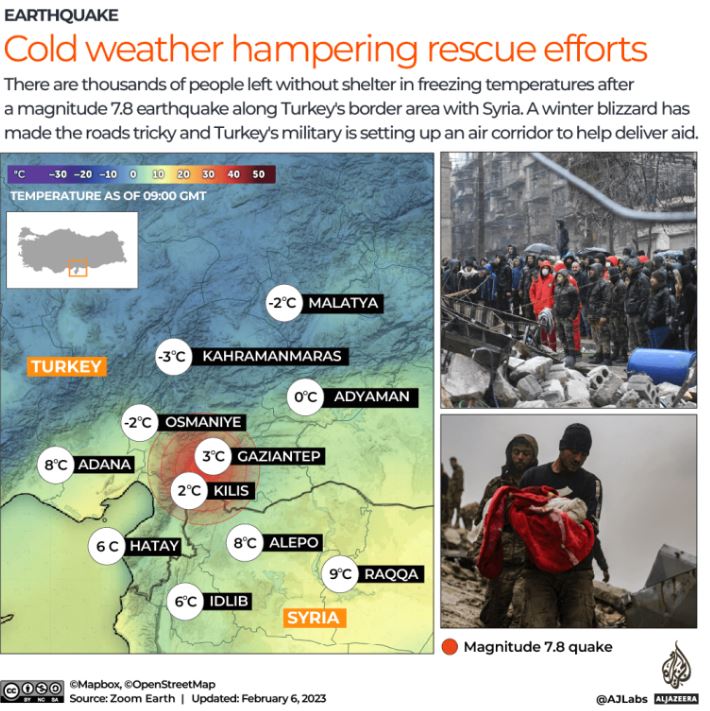President Recep Tayyip Erdogan has acknowledged that there were some issues in responding on the first day of the earthquakes, but has urged Turkish people to be patient and united.
He said there had been problems with roads and airports but that everything would get better by the day.
Erdogan also said citizens should only heed communication from authorities and ignore “provocateurs,” as thousands of people complain about the lack of resources and slow response by officials.
New houses will be built, he said, vowing that no one will be left in the streets.
“This is the time for us be united,” Erdogan added.
Turkish President Recep Tayyip Erdogan has said that the death toll in the country from Monday’s earthquakes has reached 8,574, even as rescue workers are continuing to search for victims buried under mountains of rubble.
Erdogan was speaking from Kahramanmaras during a visit to some of the areas worst hit by the temblors.
At least 2,530 people have died in Syria, according to a tally of numbers made public by the government in Damascus and rescue groups in rebel-held regions, taking the total death toll from the earthquakes in excess of 11,000.
Turkish President Tayyip Erdogan on Tuesday declared a state of emergency in 10 provinces devastated by two earthquakes that killed more than 5,100 people and left a trail of destruction across a wide area of southern Turkey and neighboring Syria.
A day after the quakes hit, rescuers working in harsh conditions were struggling to dig people out of the rubble of collapsed buildings in a “race against time”.
As the scale of the disaster became ever more apparent, the death toll looked likely to rise considerably. One United Nations official said it was feared thousands of children may have been killed.
Key Updates
-
Rescuers save young Syrian refugee from rubble in Turkey
-
Adds details from Erdogan visit
-
Anger in Turkey and Syria over government response
-
Combined death toll tops 11,000
-
International aid gathers pace
Rescuers save young Syrian refugee from rubble in Turkey
The Turkish President Recep Tayyip Erdogan has declared a three month state of emergency in the country after Monday’s devastating earthquake and its aftershocks.
- Turkish President Recep Tayyip Erdogan announced public mourning throughout the country for a period of 7 days due to the earthquakes that struck southern Turkey.
- Turkish President Recep Tayyip Erdogan said on Twitter that “search and rescue teams were immediately dispatched” to the areas hit by the earthquake.
- Turkish authorities said the quake was a magnitude 7.6. The USGS said the earthquake was a magnitude 7.5, reporting it hit at 1:24 pm (1024 GMT) four kilometers (2.5 miles) south-southeast of the town of Ekinozu in the Kahramanmaras, where the 7.8 earthquakes hit hours earlier.
Some 23 million people could be affected by the massive earthquake that has killed more than 5,000 so far, the World Health Organization has said.
“Event overview maps show that potentially 23 million people are exposed, including around five million vulnerable populations,” the World Health Organization’s senior emergencies officer Adelheid Marschang said.
“Civilian infrastructure and potentially health infrastructure have been damaged across the affected region, mainly in Turkey and northwest Syria,” Marschang added.
The WHO “considers that the main unmet needs may be in Syria in the immediate and mid-term,” Marschang told the WHO’s executive committee in Geneva.
STORIES
We have to check all the faces’
Hundreds of bodies in stadiums and parking lots lay on the ground as relatives carefully lift blankets from their faces to try to identify them.
Nada, a Syrian woman, and her Turkish husband asked a staff member how best to find their niece and aunt among the more than 100 bodies lined up on the parking lot of the Hatay Research Hospital near the southern city of Antakya, Reuters reported.
“Check one by one,” they were told.
“My wife doesn’t speak Turkish, and I can’t see very well,” the husband, who did not give a name, told the news agency. “We have to check all the faces. We need help.”
Many of those killed in the tremor were wrapped in body bags, blankets or tarpaulin, awaiting relatives or friends to find them and take them from the field hospital.
They were placed in tents or on the pavement outside the 1,130-bed hospital, built in 2016, which was too damaged by the earthquake to house them.
Some had tags with identifying information, some did not. Relatives who locate loved ones are issued a death certificate and burial permission from the on-site prosecutor, then they remove them in their own vehicles.
One woman who could not find her sister yelled: “My God, look how we are, we will be thankful if we find dead bodies of our people.”
People in Gaziantep mentally and physically ‘traumatised’

- Gaziantep, Turkey – The vast majority of people in Gaziantep have spent the aftermath of the earthquake inside bunkers and improvised shelters around their neighborhoods.Amidst water and electricity outages, hardly anyone seems to have slept.The less lucky ones have spent the night outside, in open-air spaces, around a fire to warm up amid the freezing temperatures.Inside bunkers, parents have done their best to keep young children busy with toys and mobile apps, but their cries have kept people inside the shelters awake.But they wouldn’t have slept anyway, frantically spending hours checking their phones for any news from loved ones, to keep in touch despite the distance – either within the city or between Turkey and Syria, as many displaced Syrians residing in Gaziantep have families on the other side of the border, affected by the same tragedy.Many struggled to fall asleep because of the dizziness and the constant feeling that the earth beneath their feet was shaking, when it was just their bodies – physically and mentally traumatised. After the trauma, they’re just convinced that a shake will come at any minute.This morning the city woke up deserted, with people still in shock. Many prefer to stay inside their cars rather than their apartments. Those cars are filled with luggage, ready to leave as soon as the opportunity allows it.

Source: Agencies





